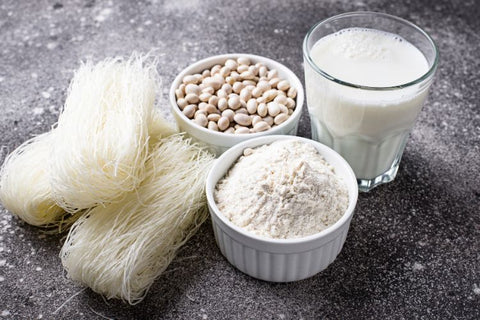As interest in plant-based diets and protein supplements grows, so does the curiosity about their effectiveness in building muscle. This article explores the benefits of plant-based protein powder for muscle growth, including its amino acid profile, digestibility, and anti-inflammatory properties. We'll also discuss its comparison to animal-based proteins and its role in promoting overall health. Let's delve into why plant-based protein could be a smart choice for muscle building and well-being.
Complete Amino Acid Profile
Muscle building is a complex process that relies on a delicate balance between muscle protein breakdown and muscle protein synthesis (MPS). Protein provides the amino acids, the building blocks of proteins, necessary for MPS. A complete amino acid profile refers to a protein source that contains all nine essential amino acids your body cannot synthesize on its own. These essential amino acids play crucial roles in stimulating MPS and promoting muscle growth. Here's a deeper dive into how a complete amino acid profile supports muscle building:
- Leucine: Often referred to as the "trigger" for MPS, leucine plays a key role in initiating the muscle-building process. It signals the mTOR pathway, a cellular pathway that regulates protein synthesis.
- Other Essential Amino Acids: While leucine acts as the initiator, all nine essential amino acids work in concert to build muscle proteins. These essential amino acids are like puzzle pieces – all are needed for proper protein construction and muscle growth.
- Limited Availability, Increased Importance: Unlike non-essential amino acids, which your body can synthesize from other amino acids, essential amino acids must be obtained through your diet. This limited availability highlights their importance for muscle building.
Leucine Content
While not all plant-based proteins are complete proteins (containing all nine essential amino acids), several good options offer sufficient leucine, the key amino acid for initiating muscle protein synthesis, to support muscle growth stimulation. Here's a breakdown of some plant-based protein sources rich in leucine:
- Soy Protein: A complete protein source, soy protein is a frontrunner when it comes to leucine content. A typical serving of soy protein powder (around 30 grams) can provide approximately 2.5 grams of leucine.
- Brown Rice Protein: While not a complete protein on its own, brown rice protein is a good source of leucine, containing about 1.5 grams per 30-gram serving. Combining brown rice protein with other plant sources rich in complementary essential amino acids (like legumes) can create a complete protein profile.
- Hemp Protein: Another incomplete protein source, hemp protein offers a decent amount of leucine, with around 1.3 grams per 30-gram serving. Similar to brown rice protein, combining hemp protein with complementary plant sources can create a more complete amino acid profile.
- Pea Protein: While lower in leucine than the options above, pea protein still packs a decent punch, containing around 1.2 grams per 30-gram serving. As with other incomplete plant proteins, combining pea protein with complementary sources can enhance its muscle-building potential.
Digestibility
The digestibility of plant-based protein powders can vary depending on the source, but they generally tend to be easier to digest compared to animal-based protein powders, particularly whey protein. Here's a breakdown of the factors at play:
- Fiber Content: Many plant-based protein sources like legumes (beans, lentils) and some whole grains naturally contain fiber. While fiber promotes gut health overall, it can also slow down digestion, potentially leading to bloating or gas in some individuals.
- Processing Methods: The processing methods used to create plant-based protein powders can influence digestibility. Isolates, where most non-protein components are removed, tend to be easier to digest than concentrates, which contain more fiber and other carbohydrates.
- Individual Sensitivity: Just like any food, some people may experience digestive discomfort with certain plant-based protein sources due to individual sensitivities. This could be related to allergies or difficulty digesting specific components like certain starches or sugars in the plant.
Plant-Based vs. Animal-Based Protein Digestibility:
- Whey Protein and Lactose Intolerance: Whey protein, derived from milk, contains lactose, a sugar that some people struggle to digest. This can lead to bloating, gas, and cramps after consuming whey protein. Plant-based proteins are naturally lactose-free, eliminating this concern.
- Rapid Absorption vs. Slower Digestion: Whey protein is a rapidly absorbed protein source. While this can be beneficial for post-workout recovery, it can also put a strain on sensitive digestive systems. Plant-based proteins generally tend to digest slower, potentially causing less discomfort for those with sensitive digestion.
Reduced Inflammation
The exploration of plant-based protein sources extends beyond just their role in macronutrient intake. Emerging research suggests these proteins may offer additional benefits, including reducing inflammation and aiding in muscle recovery – particularly relevant for athletes and those seeking overall well-being.
- Phytonutrient Powerhouse: Many plant-based protein sources are rich in phytonutrients, natural plant compounds with potent anti-inflammatory properties. These include antioxidants, flavonoids, and carotenoids. These compounds can help combat inflammation at the cellular level, potentially reducing chronic low-grade inflammation linked to various health concerns.
- Fiber for Gut Health: Fiber, abundant in many plant-based proteins like legumes (beans, lentils) and whole grains, plays a crucial role in gut health. A healthy gut microbiome is associated with a reduced inflammatory response. By promoting a balanced gut environment, plant-based protein sources can indirectly contribute to reduced inflammation.
Low in Saturated Fat
Plant-based protein powders generally tend to be lower in saturated fat and cholesterol compared to animal-based protein powders, particularly whey protein. This difference can contribute to promoting cardiovascular health and lean muscle growth. Here's a breakdown of the benefits:
Lower Saturated Fat and Cholesterol:
- Animal vs. Plant Sources: Plant-based protein sources like legumes, nuts, seeds, and whole grains naturally contain little to no saturated fat and cholesterol. In contrast, animal-based protein sources like meat and dairy products can be higher in saturated fat, and whey protein, derived from milk, can contain some cholesterol.
- Reduced Risk of Cardiovascular Disease: High saturated fat intake is a known risk factor for heart disease. By opting for plant-based protein powders lower in saturated fat, you may be contributing to a heart-healthy diet.
Promoting Cardiovascular Health:
- Beyond Saturated Fat: While lower saturated fat is a benefit, plant-based protein sources may offer additional heart-healthy advantages. Some, like soy protein, may have cholesterol-lowering properties. Additionally, certain plant proteins are good sources of fiber, which can help regulate blood pressure and blood sugar levels, further promoting cardiovascular health.
Lean Muscle Growth and Plant-Based Protein:
- Essential Amino Acids Still Matter: Muscle growth relies on sufficient protein intake, including all nine essential amino acids your body cannot synthesize on its own. While some plant-based protein sources are not complete proteins (containing all essential amino acids), strategic combinations or consuming a variety of plant proteins throughout the day can ensure you meet your needs.
- Focus on Overall Diet: A balanced diet rich in various nutrients alongside protein is crucial for lean muscle growth. Plant-based protein powders can be a convenient way to boost protein intake, but ensure you're consuming enough fruits, vegetables, and whole grains for a well-rounded approach.
Variety of Options
Plant-based protein powders offer a diverse range of options to cater to various dietary preferences and needs. Here's a breakdown of how they can be tailored to different individuals:
Dietary Needs:
-
Vegan: For vegans who exclude all animal products, soy protein powder (when not derived from animal rennet), pea protein powder, hemp protein powder, and brown rice protein powder are all excellent choices.
-
Vegetarian: Vegetarians who avoid meat but consume dairy can explore whey protein powder or casein protein powder derived from milk. However, many vegetarians also opt for plant-based protein powders due to potential health benefits or ethical concerns.
-
Lactose Intolerance: Whey protein, derived from milk, contains lactose, a sugar that some people struggle to digest. Plant-based protein powders are naturally lactose-free, making them a suitable alternative.
-
Gluten Intolerance: While some plant-based protein powders might be derived from gluten-containing grains like wheat, many options are gluten-free, such as soy protein powder, pea protein powder, rice protein powder, and hemp protein powder. Look for powders labelled gluten-free to ensure they are processed to remove gluten.
Sustainable and Ethical Choice
The world of protein is no longer limited to just meat and dairy. Plant-based protein sources are gaining traction, not only for their health benefits but also for their positive impact on the environment and ethical considerations. Let's delve into why opting for plant-based protein can be a win-win for your body and the planet.
Environmental Impact:
-
Land and Water Conservation: Livestock production demands vast areas for grazing and growing feed crops. Plant-based protein sources, like legumes and grains, generally require less land and water, promoting a more sustainable food system.
-
Reduced Greenhouse Gas Emissions: The livestock industry is a significant contributor to greenhouse gas emissions, particularly methane from cows. Choosing plant-based protein can help lower your carbon footprint.
-
Resource Efficiency: By reducing reliance on animal agriculture, plant-based protein helps conserve precious resources like water and arable land, allowing them to be used for other purposes.
Ethical Considerations:
-
Animal Welfare Concerns: Factory farming practices often raise concerns about animal welfare. Choosing plant-based protein can be a way to avoid supporting these practices.
-
Combating Antibiotic Resistance: The overuse of antibiotics in livestock farming contributes to the growing problem of antibiotic resistance in humans. Plant-based protein eliminates this concern.
-
Sustainable Food Systems: The environmental impact of animal agriculture raises ethical concerns about its long-term sustainability. Plant-based protein offers a more sustainable approach to meeting our protein needs.
Conclusion
Plant-based protein powder presents a viable option for individuals looking to build muscle while also considering health, environmental, and ethical factors. With a complete amino acid profile, good leucine content, digestibility, and potential anti-inflammatory properties, plant-based protein can support muscle growth effectively. Furthermore, its lower saturated fat and cholesterol content contribute to cardiovascular health. By offering a variety of options to suit different dietary needs and preferences, plant-based protein powder stands as a sustainable and ethical choice for both individuals and the planet.
Key Takeaways
- Plant-based protein powders can provide all nine essential amino acids necessary for muscle growth, with options like soy protein offering a complete profile.
- Leucine, a key amino acid for muscle protein synthesis, is present in significant amounts in various plant-based protein sources, supporting muscle growth stimulation.
- Plant-based protein powders are generally easier to digest compared to animal-based options like whey protein, making them suitable for individuals with sensitive digestion.
- Phytonutrients and fiber found in plant-based protein sources have anti-inflammatory properties, potentially aiding in muscle recovery and overall health.
- Plant-based protein powders are naturally lower in saturated fat and cholesterol compared to animal-based options, promoting cardiovascular health and lean muscle growth.
- Plant-based protein powders offer diverse options to cater to various dietary preferences and needs, including vegan, vegetarian, lactose-free, and gluten-free options.
- Opting for plant-based protein supports environmental sustainability and ethical considerations by reducing the carbon footprint and avoiding supporting factory farming practices.






